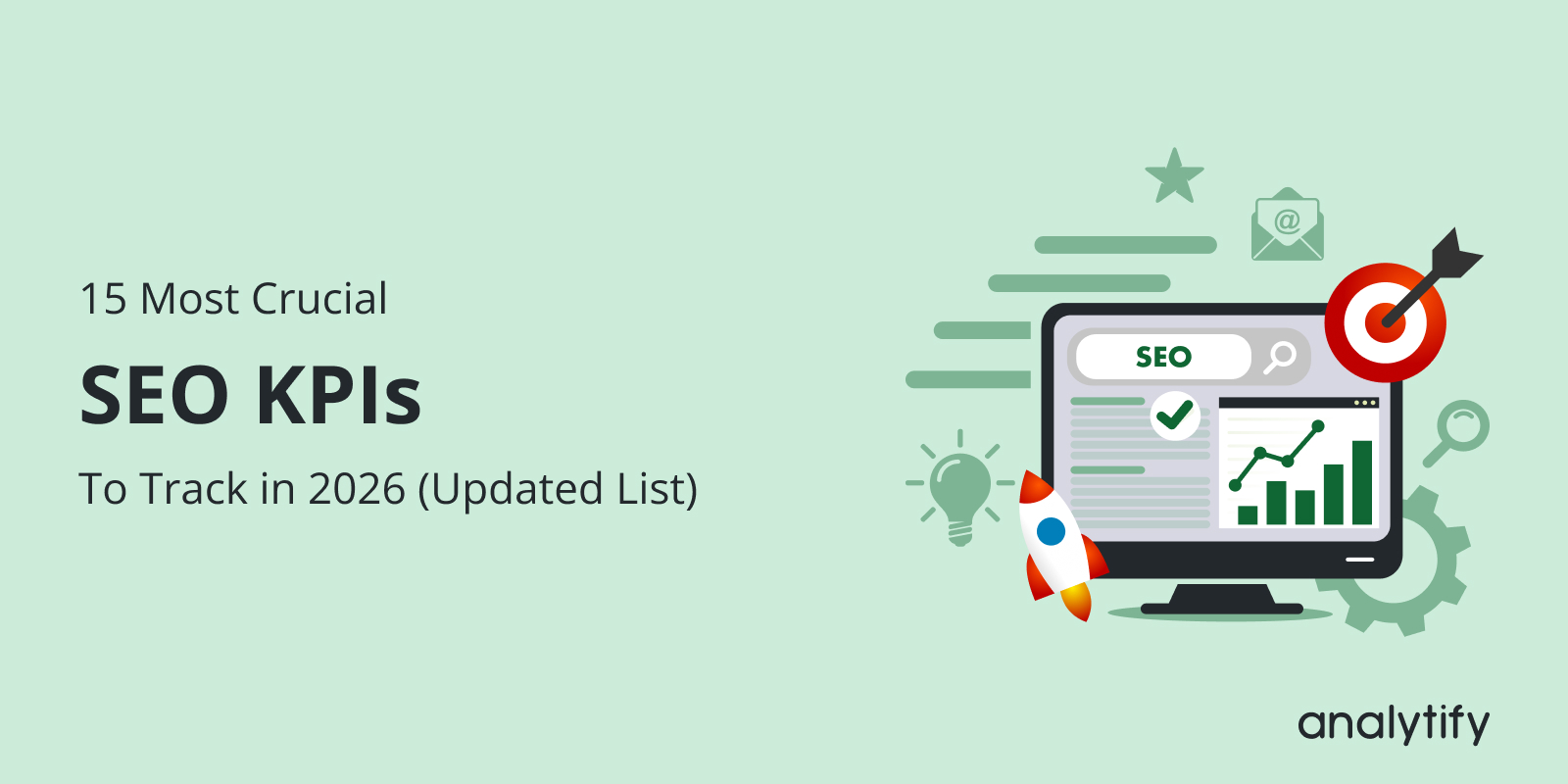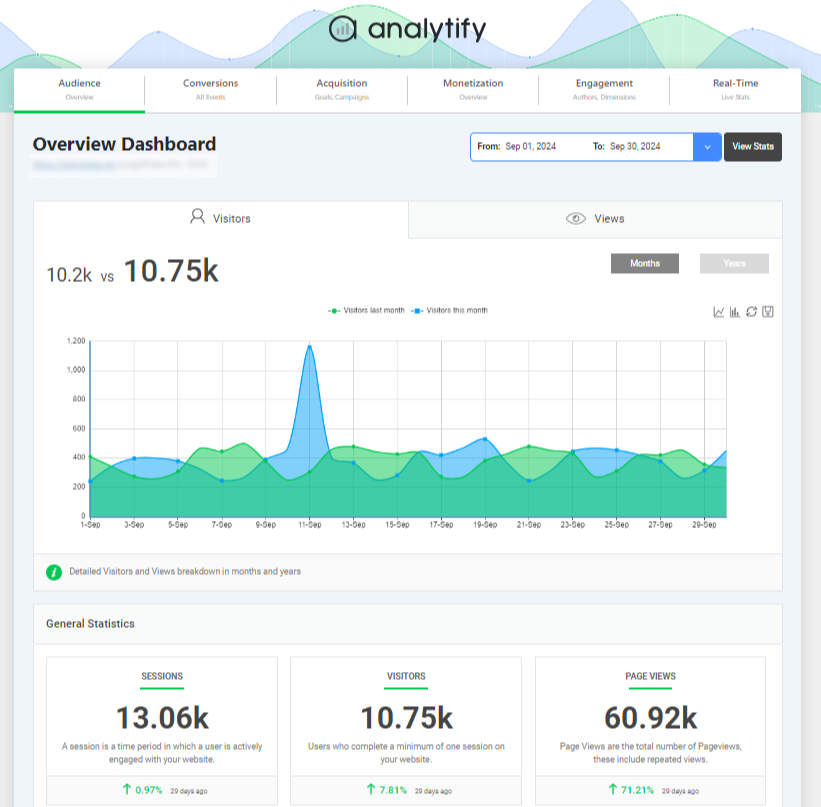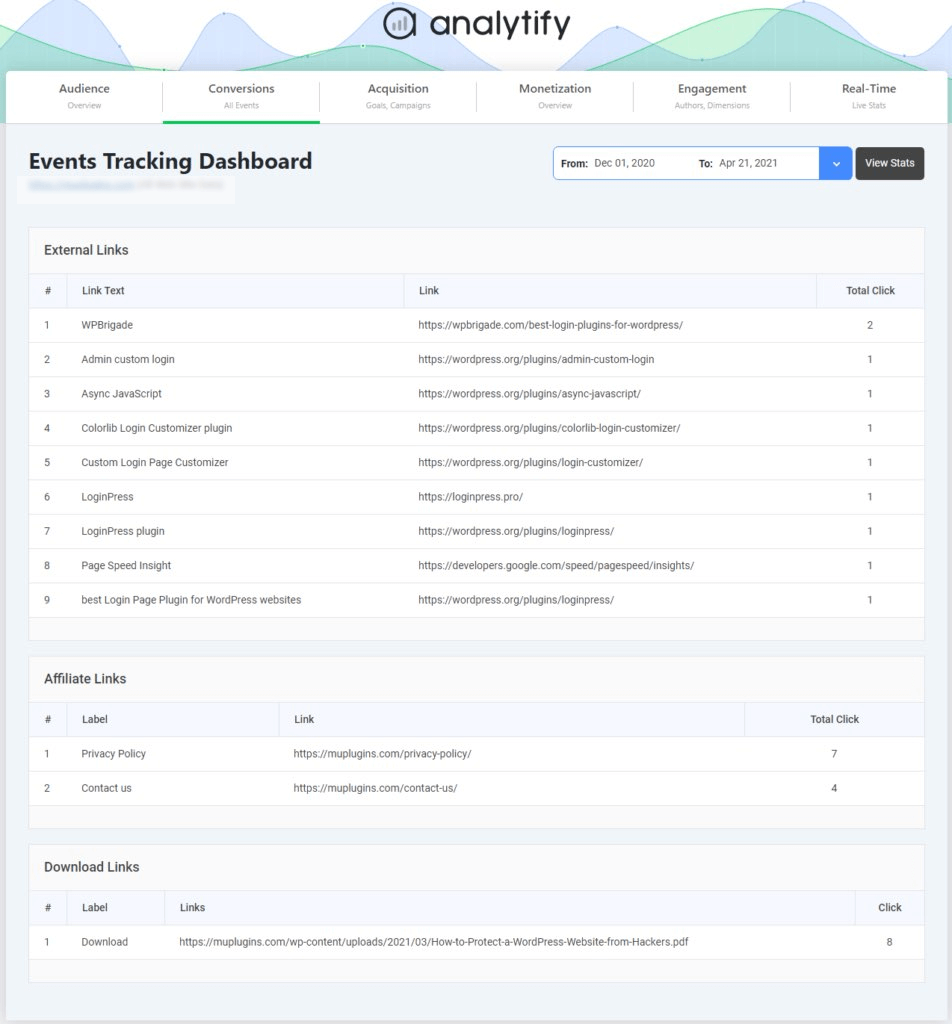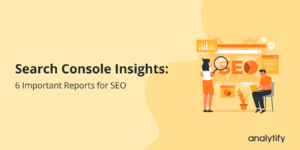
15 Most Crucial SEO KPIs to Track in 2026 (Updated List)
Have you ever wondered about the importance of SEO KPIs and which ones to track in 2026?
In 2026, SEO is changing fast. Google’s algorithms are more intelligent, and the competition is more brutal.
AI is reshaping the search engine, and with this fast-paced environment, if you’re not tracking the right KPIs, you could fall behind while others grow.
This is why we bring you this guide, which will show you the 15 most important SEO key performance indicators to watch in 2026.
These include many key KPIs like:
- Traffic, rankings, and conversions (the basics)
- Site speed and mobile-friendliness (technical must-haves)
- AI and user experience signals (new trends)
Ready to start on your journey? Let’s focus on what moves the needle.
Table of Contents
What Are SEO KPIs?
SEO KPIs (Key Performance Indicators) are metrics that can track the effectiveness of your SEO efforts on your site.
Unlike general web analytics (like total pageviews), SEO KPIs focus specifically on search-related performance. These metrics can include:
- Organic traffic growth
- Keyword ranking improvements
- Click-through rates (CTR) from search
- Conversion rates from organic search
After reading through this guide, you’ll realize that SEO strategies will not work unless you use them strategically, focusing on tracking the right KPIs.
Importance of SEO KPIs
SEO key performance indicators are important because they help measure the return on investment (ROI) of your efforts. This means they show how SEO contributes to revenue.
They also help identify weaknesses, such as underperforming pages or technical problems, so that you can fix them.
Additionally, KPIs help to guide your SEO strategy by providing real data to make informed decisions, rather than relying on guesswork. This ensures your SEO efforts are practical and in line with your goals.
The Role of SEO Key Performance Indicators in 2026
In 2026, SEO is evolving rapidly. To stay ahead of the competition means understanding these key shifts:
- AI & Machine Learning Dominate
Google’s SGE (Search Generative Experience) now favors high-quality, EEAT-aligned content (Experience, Expertise, Authority, Trust). Thin or generic content won’t cut it. Google’s AI rewards depth and originality.
In January 2026, AI Overviews appeared in 30% of search results and 74% of problem-solving queries.
- Voice & Mobile Search
Mostly searches happen on mobile these days, and if your site isn’t fast and mobile-friendly, you’ll lose rankings and customers. According to stats, 96% of internet users access the web via mobile devices.
- Core Web Vitals
Google now strictly enforces page experience metrics on your site, and this can affect the site ranking. Some of these core web vitals are:
- Loading speed (LCP)
- Interactivity (FID)
- Visual stability (CLS)
- Fail these, and your rankings suffer.
Tracking the proper SEO key performance indicators, as mentioned in the above section, will help you adapt faster and outrank competitors.
SEO KPI Example:
Organic Traffic per Blog Post
Scenario: A “How to Start Dropshipping” guide drives 3x more traffic than other posts.
Action: Create more in-depth guides on related subtopics with more emphasis on updated content.
Result: Higher rankings for long-tail keywords + more affiliate revenue.
Need Help Staying Ahead?
Try Analytify to monitor your SEO performance in real time.
Top 15 SEO KPIs to Track in 2026
Here’s a structured breakdown of the 15 most crucial SEO key performance indicators to track in 2026. This list is organized into Core, Technical, and Emerging categories for strategic focus.
Core SEO KPIs
The following fundamental KPI for SEO should be tracked regardless of your site type or SEO strategy. Let’s go through them one by one:
1. Organic Traffic
What Is It: The visitors from search engines that click on your site in a pure organic way.
Why it matters: This is a direct indicator of SEO health, hence proving to be an essential SEO KPI to track in the long run.
2. Keyword Rankings
What Is It: This KPI SEO targets the positions of focus keywords on your site.
Why it matters: This means the higher the rankings, the more visibility your site will have.
3. Click-Through Rate (CTR)
What Is It: This SEO KPI tracks the percentage of users who are clicking your search snippet.
Why it matters: This improves with better meta titles/descriptions.
4. Bounce Rate
What Is It: This KPI in SEO tracks visitors who leave without interacting.
Why it matters: This means the high rates signal poor relevance or UX of your site.
5. Conversion Rate
What Is It: This SEO KPI tracks the percentage of organic visitors completing goals of your site, such as sales or sign-ups.
Why it matters: This ties your SEO efforts to the total revenue your site brings.
6. Pages per Session
What Is It: This KPI in SEO measures the average pages viewed per visit.
Why it matters: This can help you track the most viewed pages and ensure better engagement.
7. Backlinks (Quantity & Quality)
What Is It: This SEO KPI tracks the inbound links from authoritative sites.
Why it matters: This can help you boost domain authority and rankings.
Technical KPI for SEO
Technical SEO key performance indicators are such behind-the-scenes performance and crawlability metrics that are essential for more advanced-level KPIs to track for better ranking of your site. Let’s explore these technical SEO KPIs:
1. Page Load Speed
What it is: This SEO KPI tracks the time taken to load a page fully.
Why it matters: Critical for rankings and UX (Google’s Core Web Vitals).
2. Core Web Vitals
What Is It: Some of the core vitals that need to be tracked are:
- Loading (LCP)
- Interactivity (FID)
- Visual stability (CLS).
Why it matters: This SEO KPI helps to direct Google ranking factors
3. Crawlability & Indexability
What Is It: This KPI for SEO keeps track of how easily Google can crawl/index your site.
Why it matters: This is important as the unindexed pages won’t rank on Google.
4. Structured Data Errors
What Is It: This SEO KPI addresses schema markup issues (e.g., product reviews).
Why it matters: This KPI ensures the snippets are SEO rich, which helps improve CTR.
5. Mobile Usability
What Is It: Mobile-friendliness (e.g., tap targets, font size).
Why it matters: Google’s mobile-first indexing prioritizes this SEO KPI.
Emerging SEO KPIs
This list refers to such emerging KPIs in 2026 that are quickly gaining importance to enhance the SEO of your site and improve your ranking. Here’s the list of emerging KPI for SEO that you need to bookmark and start tracking today:
1. Featured Snippet Ownership
What Is It: This SEO KPI refers to how often you appear in “Position 0.”
Why it matters: According to recent studies, featured snippets get approximately 35.1% of all clicks.
2. AI-Powered Content Depth Score
What Is It: How thoroughly does the content cover subtopics, and the depth of your content?
Why it matters: Google’s SGE rewards comprehensive content.
3. EEAT Signals (Experience, Expertise, Authority, Trust)
What Is It: Author credentials, citations, and real-world expertise.
Why it matters: Essential for ranking AI-generated content.
How to Track and Measure SEO KPIs
Tracking SEO key performance indicators is effortless with the right tools. Here’s how to use them:
1. Analytify (WordPress SEO Dashboard)
Analytify simplifies tracking by integrating GA4 & GSC directly into WordPress, allowing you to:
- View real-time SEO metrics without leaving your dashboard.
- Track top-performing pages, traffic sources, and conversions in one place.
- Get automated reports on critical KPI for SEO.
To learn more about analytics information, you can check out these in-depth blogs:
- How To Add Google Search Console To WordPress: The Definitive Guide (2026)
- Google Search Console Insights: 6 Important Reports for SEO
2. Google Analytics 4 (GA4)
GA4 is the recent update to Universal Analytics, which is a platform to track your website’s analytics. Some of its features are:
- Tracks organic traffic, conversions, bounce rate, and user engagement.
- Set up custom reports to monitor SEO-specific goals.
3. Google Search Console (GSC)
Google Search Console (GSC) is a free web service offered by Google that helps website owners to monitor, maintain, and troubleshoot their site’s presence in Google Search results. You can register your WooCommerce site in GSC to ensure proper SEO.
It shows you:
- Which keywords bring traffic to your site
- How often your pages appear in Google searches
- If Google is having trouble crawling or indexing your site
- Mobile usability issues that could hurt rankings
Interpreting SEO KPIs Data and Making Adjustments
Tracking SEO KPIs is just the first step, but the real value comes from acting on the data you’ve tracked. Here’s how to analyze trends and optimize your SEO strategy:
1. Analyzing Trends
You should ignore short-term drops and focus on weekly/monthly trends after tracking SEO KPI.
Some of the common causes of fluctuations are:
- Algorithm updates
- Seasonal demand shifts
- Competitor content changes
2. Adjusting Your SEO Strategy
After initially interpreting the trends in your KPI tracking, you can adjust your SEO strategy accordingly.
If you’re experiencing low rankings, then update old content or improve backlinks. Or in case of high bounce rate, make pages more engaging or faster.
3. A/B Testing
A/B testing is a testing technique where two different versions of the same product are implemented to check which version performs better.
- Tools: Google Optimize, RankMath, or Analytify’s goal tracking.
Tracking SEO Key Performance Indicators with Analytify
Join 50,000+ beginners & professionals who use Analytify to simplify their Google Analytics!
Analytify eliminates the guesswork of analyzing which seo campaign is working or not. It does so by bringing all critical SEO KPIs directly into your WordPress dashboard. Best of all, no coding or complex steps are required to install and configure Anaytify into your setup.
Here’s why Analytify is the best tool for tracking SEO performance in 2026:
1. Overview SEO Dashboard
Stop wasting time switching between Google Analytics, Search Console, and third-party SEO tools.
Analytify provides you:
- Real-time Traffic Trends: Monitor growth in high-intent keywords.
- Top-Performing Pages: Identify which content drives the most SEO traffic.
- Bounce Rate & Session Duration: Spot engagement issues hurting rankings.
- Key Events Tracking (Leads, Sales, Signups): Measure how SEO impacts revenue.
This ensures quick access to your site’s KPI for SEO so that you can make informed decisions.
2. Automated Email Notifications
Analytify automates user-friendly email reports right into your inbox. Here’s how it serves you:
- Schedule Weekly/Monthly Reports: Sent straight to your inbox.
- White-Label Dashboards: Share progress with clients or teams.
- Focus on High-Impact Metrics: Filter noise (e.g., exclude bot traffic).
3. WooCommerce Tracking Add-On
For online stores, SEO and sales data must work together. Analytify’s WooCommerce Add-On reveals:
- Top Converting Keywords: Which search terms drive purchases?
- Product Page Performance: Optimize underperforming pages.
- Cart Abandonment Rates by Traffic Source: Fix leaks in organic funnels.
Frequently Asked Questions
1. What are the 3 most important KPI for SEO?
Organic traffic growth
Keyword rankings (top 3 & top 10)
Conversion rate from search
2. How often should I check SEO KPIs?
Weekly: Rankings, traffic trends
Monthly: Backlinks, technical health
Quarterly: Full strategy review
3. Can I track SEO Key performance indicators for free?
Yes! Google Analytics + Search Console covers the basics. For deeper insights (and time savings), tools like Analytify help.
4. Why did my traffic drop despite good rankings?
Possible causes:
Algorithm update (check Google’s announcements)
Seasonal trends (compare year-over-year data)
CTR decline (improve meta titles/descriptions)
Final Thoughts
Tracking the proper SEO KPIs isn’t just about data. It is about making more intelligent decisions that drive real growth. In 2026, with AI, voice search, and ever-changing algorithms, the websites that win will be the ones that:
- Measure what matters (traffic, rankings, conversions)
- Fix what’s broken (slow pages, high bounce rates)
- Double down on what works (top-converting keywords, high-value content)
That’s all for this article. For more related posts, check out the following:











